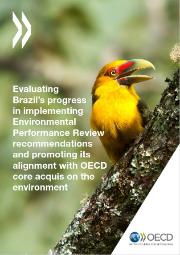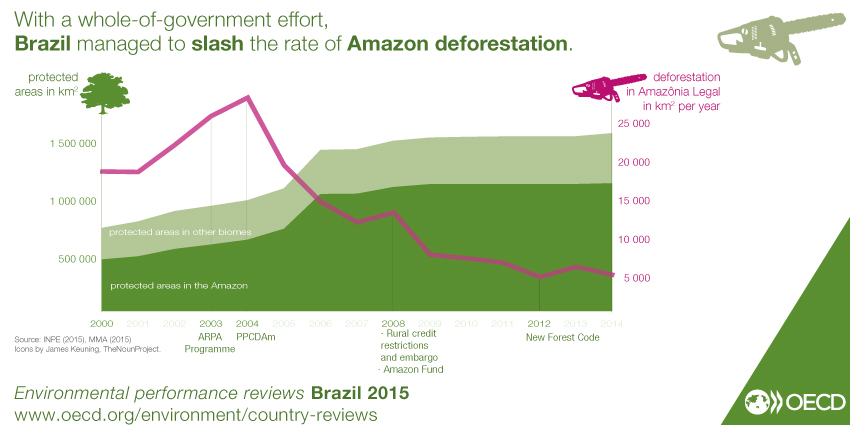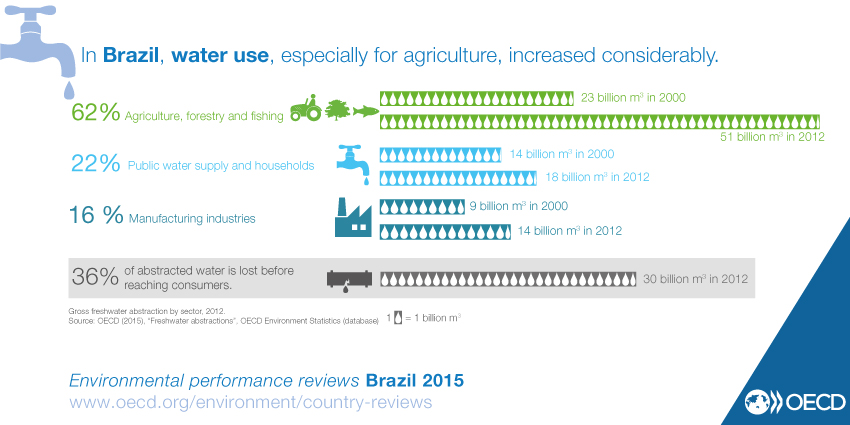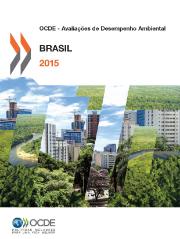2021 Report on Brazil's progress on EPR recommendations and alignment to OECD environmental acquis
 |
This report examines Brazil’s alignment with 23 selected OECD legal instruments related to the environment. The legal instruments were primarily selected for their link to the recommendations of the 2015 OECD Environmental Performance Review (EPR) of Brazil. The report also looks at Brazil’s progress in implementing 13 out of the 53 EPR recommendations that are relevant to the OECD acquis. The substantive areas covered are the polluter-pays principle, environmental assessment, integrated pollution prevention and control, environmental performance of government, use of economic instruments and provision of environmental information, as well as water management, biodiversity conservation, energy and air pollution, transport and waste.
The main objective of the report’s analysis and recommendations is to help Brazil improve its policies and practices in line with OECD standards. The report provides a brief overview of the legal instruments and the context and content of the relevant 2015 EPR recommendations. This overview is followed by a description of the relevant legal and policy framework in Brazil, recent changes to it, the state of their implementation and, where possible, evidence of their effectiveness.
The report was made possible by financial support of the government of the United Kingdom.
Read the report here.
|
|
English highlights
|
destaques em português
|
press release
The OECD’s first-ever Environmental Performance Review of Brazil draws attention to the strong progress made in reducing deforestation and emissions of greenhouse gases over the past 15 years. It also points out, however, that a decade of rapid urbanisation and economic growth have increased pressure on the environment, with severe water shortages in the southeast, soil contamination from inadequate wastewater treatment and rising air pollution. More people now have access to clean water, sanitation and waste management services, but regional disparities are large.
“Brazil has made tremendous progress in terms of its environmental performance, but rigorous policy implementation remains critically important,” Mr Gurría said. “Greening the economy can also bring huge social and economic opportunities, with green markets offering potential to boost GDP by up to 7 percent.” (read the speech in full)
The high share of hydropower and biofuels in the Brazilian energy mix helps keep the economy’s carbon intensity low; to that end, greenhouse gas emissions have dropped by more than 40% since 2000, thanks to the decline in deforestation, but emissions from industry and transport are nonetheless rising.
The Review recommends Brazil do more to link environmental priorities with economic policies so as to ensure the sustainable use of its environmental resources. Brazil should strengthen implementation and enforcement capacity at local level to reduce the gap between ambitious environmental goals and policies actually implemented in areas such as public transport and waste management.
The Review also recommended that Brazil:
- Adjust energy taxes to reflect the carbon content of fuels and introduce taxes on pollution, waste and use of natural resources.
- Further streamline environmental licensing procedures and build administrative capacity.
- Explore opportunities for eco-tourism in its vast protected area network.
- Develop a framework law for payments for ecosystem services and better monitor their effectiveness.
- Develop a uniform system for collecting and managing environmental data.
OECD Secretary-General Ángel Gurría presented the Economic Survey of Brazil and the Environmental Performance Review of Brazil in Brasilia during meetings with Brazil’s Finance Minister Joaquim Levy and Environment Minister Izabella Teixeira. This follows the launch on 3 November of the new OECD-Brazil Programme of Work, which seeks to further strengthen co-operation in various policy areas.
/ Read the press and Twitter review
key findings
Natural resources are essential to Brazil’s development: it is among the major global agricultural, minerals and oil producers, and hydropower generates most of its electricity. Protected areas extend over a large part of the country and deforestation in the Amazon has dropped remarkably, which in turn has helped curb greenhouse gas emissions.

However, economic growth and urban, agricultural and infrastructure expansion have also meant increased energy and resource use and consequent environmental pressures.

Quality and coverage of environmental services need to be further improved. While Brazil’s environmental laws are stringent, implementation and enforcement gaps persist. In the current context of a contracting economy, better integrating environmental objectives into economic and sectoral policies would help Brazil move towards a greener, more sustainable development path.
EM PORTUGUês
| Destaques
|
Resumo Executivo
Avaliação e recomendações

|
contact and social media




